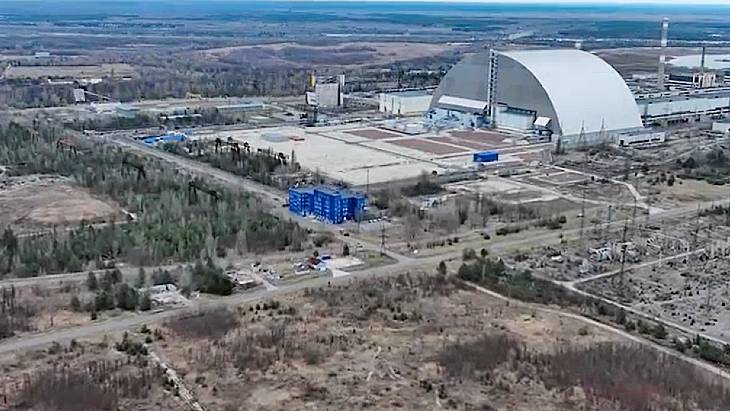Ukraine regulator's communications with Chernobyl restored
20 April 2022
International Atomic Energy Agency (IAEA) Director General Rafael Mariano Grossi said the re-establishment of direct phone communication between the State Nuclear Regulatory Inspectorate of Ukraine (SNRIU) and Chernobyl was an "important step in the process of resuming Ukraine's regulatory control of the site".
 Drone footage of Chernobyl (Image: Chernobyl NPP)
Drone footage of Chernobyl (Image: Chernobyl NPP)Russian forces took control of the Chernobyl site and exclusion zone on 24 February, before leaving at the end of March. Direct contact with SNRIU was lost from 10 March, although it continued to receive information about the situation through senior off-site management of the plant.
"This was clearly not a sustainable situation, and it is very good news that the regulator can now contact the plant directly when it needs to," the IAEA's Grossi said.
The IAEA says that reliable communication with the regulator is one of "seven indispensable pillars" of nuclear safety and security that the director general outlined at the beginning of the conflict in Ukraine.
Grossi plans to lead a team of IAEA experts to Chernobyl before the end of the month "to conduct nuclear safety, security and radiological assessments, deliver vital equipment and repair the agency's remote safeguards monitoring systems". Footage, including some taken from drones, filmed since the Russian departure, appears to show that they built trenches and other fortifications in parts of the exclusion zone.
The IAEA is still not receiving automated monitoring transmissions from the Chernobyl area - they stopped in early March - although it continues to receive them from Ukraine’s other nuclear power plants.
In its daily updates, Ukraine's nuclear power plant operator Energoatom said all four of its plants were operating within usual safe limits on Wednesday. Seven of the country's 15 operational reactors are currently connected to the grid, with the other eight shut down for regular maintenance or held in reserve.
Researched and written by World Nuclear News
No comments:
Post a Comment